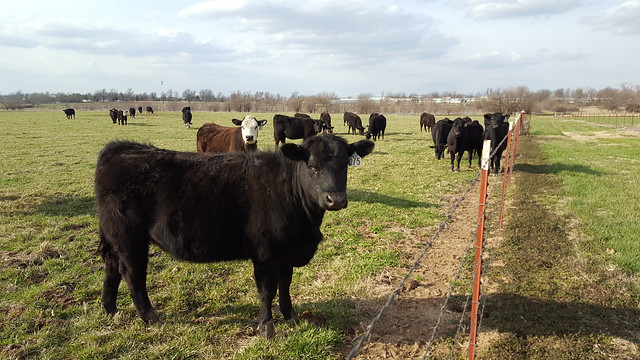Researcher offers pointers on keeping pastures healthy in hot, dry summers
Researcher offers pointers on keeping pastures healthy in hot, dry summers
By Fred Miller
U of A System Division of Agriculture
Fast Facts:
- Wet, cool spring delayed forage growth
- Summer came on hot and dry
- Division of Agriculture scientists offers pointers for healthy pastures
(402 words)
Download related PHOTOS: https://flic.kr/s/aHsmf8Ndoc
FAYETTEVILLE, Ark. — Arkansas’ summer has come on hot and dry, presenting challenges for maintaining healthy pastures, said Dirk Philipp, associate professor of animal science and forage researcher for the University of Arkansas System Division of Agriculture.

The main perennial forages in Arkansas are tall fescue and bermudagrass,” Philipp said.
“Although rain during spring was plentiful, soil profiles are getting dry,” Philipp said. “Pastures suffer when the weather turns hot and dry following a wet and cool spring that delays growth.”
Fescue ceases growth during hot conditions, Philipp said. “During those times, fescue should not be mowed or grazed to avoid damage to the sward.”
If producers decide to cut fescue for hay under these conditions, Philipp said, they should leave at least 4 inches of leaf material on the plants to ensure enough area for photosynthesis.
Philipp said producers should not keep cattle on summer-dormant fescue pastures to avoid overgrazing, soil compaction and creating openings for weed encroachment.
“Have a plan in place to move animals somewhere else,” Philipp said, “preferably onto a warm season perennial pasture or pastures of summer annual forages.
Bermudagrass, because it is a warm-season perennial, will keep growing when it gets hot, Philipp said. But the wet, cool spring this year resulted in little growth going into the hot summer months. Conditions are compounded by a lot of weed pressure, he said.
When field size is manageable, Philipp said, bushhog fields to cut down on weeds and fertilize the bermudagrass with about 50 to 60 pounds of nitrogen per acre.
“Once rain resumes, bermudagrass will begin growing again and we’ll have about three months of growing season left,” Philipp said.
If drought conditions persist, Philipp said, handle bermudagrass with care:
- Avoid excessive vehicle or animal traffic on pastures;
- If hay is needed, find a sacrifice pasture for feeding it to cattle to minimize the spread of weed seeds from the hay;
- Watch out for weed growth later in the season and following years after a drought and tackle weed control proactively to avoid longterm weed encroachment.
“In the longterm, try to stay proactive by having options available,” Philipp said. Such options can include fields planted in summer annual forages.
Sorghum-sudangrass and pearl millet are relatively drought resistant, Philipp said. Although they don’t generate their maximum yield of growth during dry conditions, the amount of plant material available may be enough to provide cattle with forage during droughts.
About the Division of Agriculture
The University of Arkansas System Division of Agriculture’s mission is to strengthen agriculture, communities, and families by connecting trusted research to the adoption of best practices. Through the Agricultural Experiment Station and the Cooperative Extension Service, the Division of Agriculture conducts research and extension work within the nation’s historic land grant education system.
The Division of Agriculture is one of 20 entities within the University of Arkansas System. It has offices in all 75 counties in Arkansas and faculty on five system campuses.
Pursuant to 7 CFR § 15.3, the University of Arkansas System Division of Agriculture offers all its Extension and Research programs and services (including employment) without regard to race, color, sex, national origin, religion, age, disability, marital or veteran status, genetic information, sexual preference, pregnancy or any other legally protected status, and is an equal opportunity institution.
Media Contact: Fred Miller
U of A Division of Agriculture
Arkansas Agricultural Experiment Station
(479) 575-5647
fmiller@uark.edu
Related Links